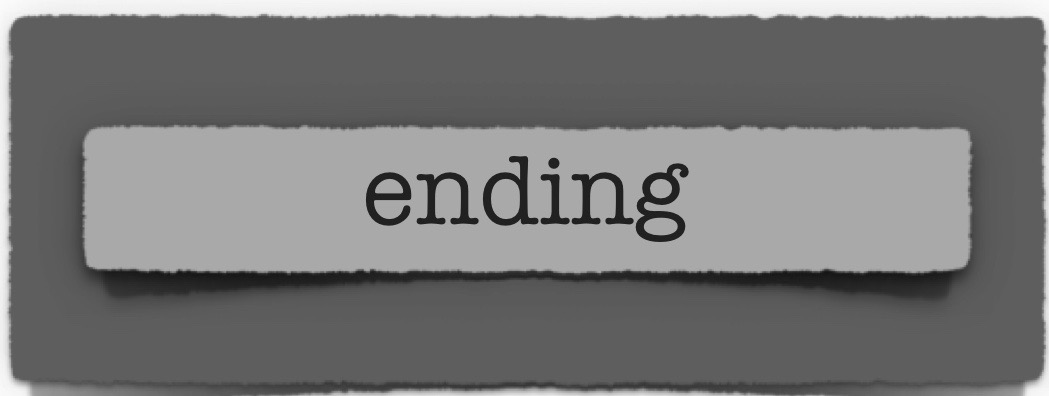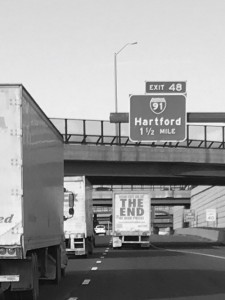My mode of travel for my commute to the computer store in New Haven depends on my vacillating schedule. If I go in early and come home early, I can take the train, which is a twenty minute ride along the shoreline of the Long Island Sound and then a walk of a little less than a mile across the New Haven Green and through the Yale campus. If I stay later than the train runs with any frequency or it’s a Saturday, I drive in, as I did today. Somewhere on South I-95 I saw a truck a few hundred yards ahead in my lane.
From my car, all I could see were the two words in largest print: THE END, and I thought to myself, “If that is the end, then am I what comes after it?” Besides the fact that The End was moving down the highway, it was leaving a trail of life behind it.
I parked in the lot assigned to us and walked only five or six minutes through the frigid morning air to get to the store. Thanks to my father, I am perpetually early, so I had time to sit and read for a bit before work began, turning to the next essay in Donald Hall’s book, which was titled “One Road.” In the final paragraph he made this statement:
But there are no happy endings, because if things are happy they have no endings. (37)
Needless to say, I have thought a great deal about endings over the past few months thanks to our leaving Durham to move to Connecticut and my mother’s death. Both had an extended quality to them that was both beautiful and difficult. We knew in July we were moving north, but we didn’t leave until the first of November, which meant we had time to say goodbye, to see people we wanted and needed to see, to bake a bunch of cookies, and to cram in as many dinners as we could. People sent us off wonderfully. The church threw a wonderful farewell and then, the night before we were to drive out of town a bunch of friends threw a party for me that is an indelible memory.
The plan was to get up the next morning and pack what was left into our Jeep Liberty and head out. We had had time to pack. It had been my job for over a week. Friends began to call to see if we needed help, and Ginger told them to come over. When we got to the kitchen I realized I had packed none of it. Food was still in the fridge and freezer, all the cabinets were full of pretty much everything. I had just blocked it out. That room was emblematic of my life in Durham; I had no idea how to end it. People packed furiously, divided up what could be eaten and used, we ended up getting a U-Haul trailer to hold the rest of our stuff, and we finally pulled out hours later than we had imagined, leaving our friends standing on our front porch.
My mother was in hospice for thirteen days; she was aware and lucid for eleven of them, welcoming friends and carrying on conversations. The last two days she mostly slept and did not see visitors. She died on a Friday afternoon about five o’clock. My brother, Miller, his wife, Ginger, and I were in the room. We had been singing hymns, as we had done most afternoons. As I remember it, my brother and I sat down on either side of the bed, which, I realized, was the first time the two of us had done that while my mother was in hospice. We each took one of her hands. My sister-in-law was at the foot of the bed. My brother said, “Mom, I love you,” and I said the same thing. Then he looked across the bed at me and said, “And I love you, too.”
“I love you,” I replied, and then looked at Ginger and said, “and I love you, too.” And my mother stopped breathing. We could feel her leave the room.
“I think she’s gone,” Miller said, and we called for the nurse.
If I were writing a closing scene for a movie, I couldn’t have scripted a more meaningful moment. Though it was a beautiful conclusion to her time in hospice, it was not different from our leaving Durham in this sense: there was a trail of life behind it. Feelings. Details. Consequences. Beginnings.
We were all born in the middle of the story and we will all exit before the story is finished. In between are millions upon millions of curtain calls that make up the scope of human history, played on stages big and small, and none of them has the luxury of being the last word. Not being in Durham not only means starting a new chapter in Guilford, but also finding new ways to express the stories that continue through the friendships that tether me across the miles. That I now know what it feels like as a motherless (and fatherless) child a long way from home is the opening paragraph of a story I am struggling to comprehend. The transition is more complex than saying every ending is a beginning, however true that statement may be. The trail of life that follows every ending is a weave of pain and possibility, of hope and loss, of love and dreams.
I don’t have a tight finish to my post tonight other than to say, I saw The End today and kept going.
Peace
Milton


Milton, very interesting entry this evening. I too am on the verge of ending my work position and moving on but have resisted packing up. Thank you for your Lenten entires.
I really enjoy your posts. And, I just realized something we have in common. Hubby and I are native North Carolinians (I, from High Point; he, from Rockingham. We now have 88 acres and 2 homes in Banner Elk, NC; but live in Denver, Colorado, in the winter, where we raised our children. When my husband was COO of TWC in NYC, we lived for 12 years in New Canaan, CT.
So sorry for the loss of your mother; but it sounds like a beautiful sound off.
“….the friendships that tether me across the miles….” Wonderful words.